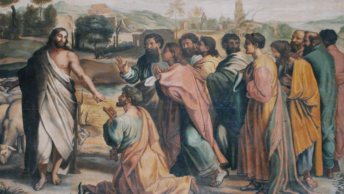My favorite depiction of Jesus on the cross is the one with arms perfectly horizontal, as to embrace the whole world. Our readings for the 20th Sunday in Ordinary Time illustrate the fact that God the Father wishes to include every single person in His saving plan. Furthermore, He wants to treat everyone as “His favorite child.” Of course, God alone can do this! To which a quick reaction from us could be: “FINE!” But, honestly, is it really so fine with us?
Here is something to think about. Every time a family expands through the birth of a new child or through adoption, the children have to adjust. They see the prospect of having to share “the pie” with more people, thus their slice will be smaller. They are afraid that the amount of attention, of caring, of love for them will be less.
While this way of reasoning is valid as far as material things are concerned, it is not valid when it comes to genuine love. For genuine love has the ability to be as intense when directed toward a single person as towards ten, twenty people. Furthermore, here we are talking about God’s plan to expand his family. He wants to bring to His holy mountain the foreigners who minister to the Lord and love His name. Since God is the Almighty Creator of all that exists, those who are already children within His family should rejoice at the prospect of the announced family expansion.
However, with the chosen people if Israel, that was not the case. If we look at the Gospel passage (Matthew 15: 21-28) of the Canaanite woman, we can see how, applying reverse psychology to change his disciples’ minds, Jesus feigns to be going along with his fellow Jews’ stereotypes in considering pagans as dogs, unworthy of sharing the same table with the Israelites, the children of God historically chosen first.
Not only Jesus refuses to acknowledge the pagan woman’s presence and ignores her plea, but he also insults her by grouping her with other pagans, other “dogs.” Indeed, in the original Greek version, the verbs that describe her actions are giving that precise impression. She yelps like a dog; she sprawls out at Jesus’ feet like a dog. Jesus is intentionally rude, offensive, insulting, prejudiced in order to elicit a beautiful response of faith from her and prove to his disciples, “the chosen ones,” how those that they despise can actually be more worthy of God’s generosity.
The lesson should not be lost on us. Presumption is an awful attitude that should not be present in God’s family, especially around God’s Table. Presumption can surface in our heart as we become indifferent to the Crucifix, as we get too familiar with the Gospel, the Sacraments and God’s countless favors. Presumption grows quickly if we reduce God to a “heavenly vending machine” yet with a limited supply of goods to deliver. Presumption festers as we might expect preferential treatment and might try to exclude others from God’s generous distribution of gifts. Presumption, in other words, wants to reduce the angle of Jesus’ outstretched arms to embrace only us, only our little group.
Therefore, it seems crucial that we examine our inner disposition towards God’s gifts and see whether or not we are living in His family with the attitude of perennial wonder, surprise, excitement and with the spirit of sharing joyfully with as many as possible.
We should be fully certain that our Daddy’s supply of goods is infinite; and, most importantly with an abiding, humble attitude of unworthiness. Since God’s best gift is Himself in Holy Communion, we should reevaluate our approach to this most wonderful and unmerited Sacrament. It is not by accident that the Canaanite woman mentions her right to eat the scraps of the Lord’s Table. She knew for certain that in the Father’s Home there is plenty for everyone and, then, some, house puppies included.
Two Sundays ago we contemplated the feeding of the 5,000 with five loaves and two fish. Last Sunday we contemplated how we can do the impossible, like walking on water, in the sense of being able to weather any storm, regardless of its magnitude, after we have been fed by Christ and placed our full trust in his presence.
Now, we learn that the best way to receive God in our hearts must include the shedding of all presumptions and assuming the humble disposition of that Canaanite woman. Like her, we should accept God’s apparent indifference, His silence—and be persistent. Like her, we should have a faith that survives loathing, insults and rejection. Like her, we should be ruled by a constant, solid base of humility that acknowledges any gift as unmerited.
And we should be very happy as God expands the boundaries of His family, and finds room for so many more people around His Table. The best way we can make God’s wish come true, I think, would be for all of us to receive the Eucharist with the attitude of that woman of great faith and be willing to be ourselves broken bread and poured blood with Christ’s. We should be truly willing to attend to the needs of the lowest members of the Father’s family with humble dedication, sincere wonder and unbridled joy.








